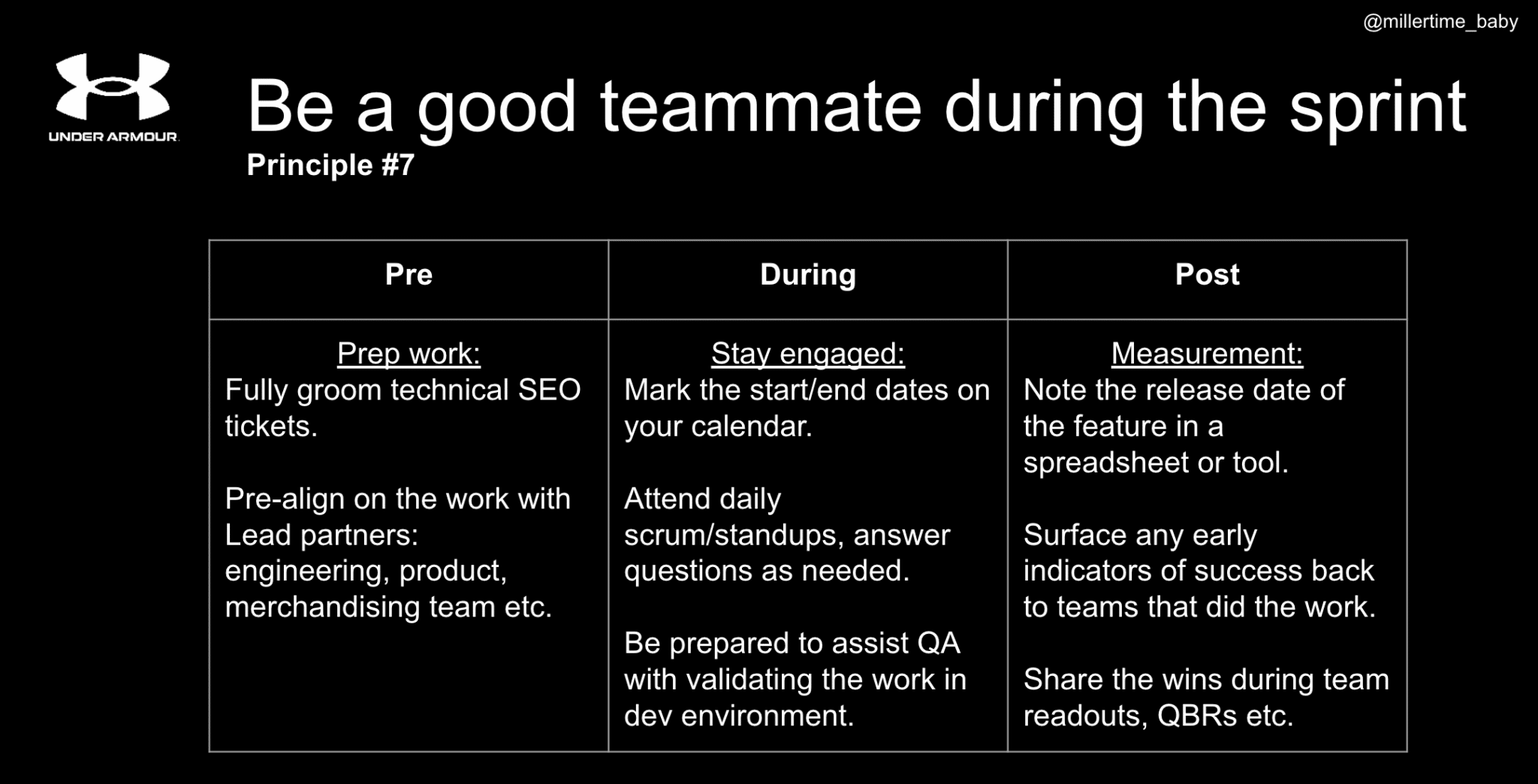Why SEO should be a product
Treating search engine optimization as a product means dedicating ample resources to growing organic traffic and revenue. Learn more here.
SEO should be a product because it is an acquisition channel for organic traffic and revenue.
SEO as a product largely means the business:
- Understands it operates in a digital-first world.
- Makes an effort for its digital properties (website, app, etc.) to be SEO-friendly.
This way, when prospective customers are searching online using their devices, looking up through an app or initiating a voice search, the subsequent digital properties are discoverable.
In a nutshell, product management is a discipline of solving problems leading with customer empathy. While search engine optimization (SEO) is the ever-evolving, broader consideration of being discoverable to customers who are using connected devices to find information, products or services.
There are increasingly more places for humans to “search” outside traditional search engines like Google, DuckDuckGo, Baidu or Microsoft Bing. Prospects can start their product search on Amazon or use YouTube if it’s a visual search.
All this is based on intent – what does the customer want?
To clarify, this article is not about optimizing product detail pages for SEO.
Instead, it examines the bigger picture of dedicating product resources to growing organic traffic and revenue and why SEO should be considered a product by businesses.
SEO as a product: What does that mean?
Let’s quickly set the stage to highlight the fact that this is a relatively new concept.
A Google Trends search for “product management” shows the interest over time has begun to peak more recently in December 2022.

By contrast, the search term “SEO” shows a healthy interest over time.

The parallel is, SEO has existed (and continues to evolve) for more than a decade. Whereas product management has just begun to pick up steam. It will take time for the role of an SEO product manager to become more prevalent.
More importantly, what also needs to evolve is how organizations operationalize their SEO program. When SEO is a product, it’s treated as an aspect of the business that drives revenue and customer acquisition.
SEO as a product means product management is applied to search engine optimization
For a long time, SEO was all about keywords, particularly how many and which ones to use on your pages. Then, Google’s algorithms evolved significantly to sniff out bad actors.
To evolve and thrive with the times, Eli Schwartz outlines the concept of a product-led approach to SEO. In his book “Product-Led SEO,” Schwartz explains:
“A Product-Led SEO effort isn’t something that only works with specific companies; rather it is a process that every website working on SEO should employ.
The key part of building a Product-Led SEO strategy is that it is a product (an offering of any sort) that is being built. This should be approached the same way any other product is: a product plan, a roadmap, project management of inputs and collaborators, and, most of all, incorporating user feedback.
Unlike a keyword-research-driven SEO effort, Product-Led SEO strategy needs to have a product-market fit.”
This largely means empathy for customers who bring profit to the business. For SEO, it’s web crawlers like Googlebot and humans.
As an SEO product manager, you have two main customers to account for – search engines and people.
Most product managers are primarily focused on one customer or target market segment (as defined by the business) but don’t realize that major search engines, like Google, are customers in their own right because they consume the products and features built for the web.
 100vw, 2048px” data-lazy-src=”https://searchengineland.com/wp-content/seloads/2023/02/what-humans-see_what-SEs-see.png” /></figure>
</div>
<hr class=)
Top 4 reasons why SEO should be a product
Consider the following compelling reasons why SEO should be a product.
- Treating SEO as a product means accounting for it as an acquisition channel for organic traffic and revenue. SEO best practices are factored into online operations to make sure search engines “see” your website and humans searching online discover your branded site or social media pages.
- SEO product managers understand the external factors (like how search engines work) and how aspects of the website need to be optimized in order for the site to be SEO-friendly and earn organic traffic.
- Due to the fluid nature of search, SEO should have its own roadmap to continuously address improvements (i.e., advancements in machine learning), growth areas (i.e., producing helpful content) and maintenance.
- No business has an infinite amount of funding or capital to be able to acquire new customers through significant investments in paid search. Organic traffic is a scalable and compounding source of revenue for new site visitors. That source needs protection and development in order to grow.
There’s a product manager for everything else that matters to a business, so why not search?
Some companies have product managers for search, but they typically deal with on-site searches performed by customers and their experience finding, or not finding, products.
In contrast, I’m referring more to an SEO product manager who is focused on two primary external customers – search engines and customers visiting the website from a search engine results page.
Read the job description for any product manager role and you’ll see that at a high level, it’s critical for businesses to develop a best-in-class app and/or ecommerce experience by providing an on-brand customer experience that drives sales and retention.
The function requires a balance of both analytical and creative chops with strong consumer instincts.
Product managers own writing the requirements in tickets that get worked on by engineering teams. This is where SEO requirements or considerations can come into play.
Is there a link involved? Then it should be coded as an <a href> attribute so that search engines can “read” it.
Publishing a visual product carousel? Make sure it’s not wrapped in JavaScript because if it is disabled on the customer’s end, it won’t be visible to the customer or a search engine.
SEO is an evolving discipline because it’s tied to earning organic traffic from Google’s searches and their understanding of queries and user intent, which changes over time. This ultimately means the ranking compositions themselves will shift and change.
In an episode of the Search Off the Record podcast, John Mueller spoke about the fluid nature of search. He pointed out that as Google’s understanding of queries and user intent changes, so can the ranking composition.
Human nature is dynamic and our needs change over time. For those reasons, it’s important for businesses to focus on how organic search as a channel is evolving in order to continue to drive revenue and capture new customer visits.
Move away from just asking “What do we do about the latest algorithm update?” or “Which keywords are we or are we not ranking for today?” – which is a myopic view of how search works.
It’s more productive to solve for, “First, what does my customer want? And how do we make sure Google knows we offer that?”
When SEO is a product, it benefits from the product framework which helps identify important work and implement it on the site. Then teams can measure it, learn from it, and improve upon it over time.
How SEO product management fits within an organization
In large organizations, SEO is typically managed by a manager or a team of technical SEOs, content SEOs, and analysts within marketing. SEO doesn’t typically sit within the product vertical.
But no matter where SEO sits in the organization, there will always be the need to navigate complexity and ambiguity, using a structured approach and delivering results.
SEO often suffers from a lack of resources (specifically in engineering) to get improvements made and published.
Part of the product process that most SEO professionals don’t understand is the timeframe in which work gets done. Most major technology companies (Apple, IBM, Microsoft) use agile methodology to deliver work. Lately, more companies are adopting this approach as their way of working and iterating on strategic initiatives.
This cannot be overstated. In an agile methodology approach, engineering teams operate on sprints and there are a finite amount of sprints each year. This is especially true if you’re an ecommerce brand operating with a “code freeze” time frame that is typically between November to January where no updates are made to the code base.
Because there are a finite amount of sprints, the planning process means working backward from the “pencil’s down” timeframe to prioritize the roadmap items.
It also means if you slot in new or ad hoc work, it replaces an existing initiative. These are tradeoffs the SEO product manager handles and articulates to leadership.
Early in 2022, I spoke at an industry conference about the engagement points SEO product managers have with engineering teams during the agile process which SEO managers are not accustomed to.

Similar to a “before, during and after” strategy, there are specific ways an SEO product manager supports the cross-functional teams on the pathway to delivering SEO work together.
Product is where the resources are
SEO as an acquisition source should be resourced in order to contribute to the business’s bottom line.
In reality, product managers have access to these resources and coordinate them. Engineering resources are allocated to product managers usually by vertical or discipline.
If organizations operated where SEO was treated as a product itself, then there would be:
- A product owner.
- An SEO product roadmap.
- An allocation of resources specifically for SEO initiatives.
Any tradeoffs would happen against the planned roadmap of SEO work, as opposed to other product roadmaps and teams.
It’s the difference between being empowered to organize work on your own roadmap instead of having to ask another team if you can have some of their resources to get (what’s perceived as) your work done.
SEO as a product drives organic traffic and revenue
When SEO is a product itself, teams will be empowered to do what’s best for the business in terms of nurturing and growing a scalable channel for customer acquisition and revenue.
This means an output of continuous technical improvements and revamping informational content across the spectrum of human needs – from information to purchase.





